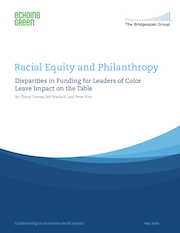Site Search
- resource provided by the Forum Network Knowledgebase.
Search Tip: Search with " " to find exact matches.
In celebration of its one-year anniversary, the New Jersey Pandemic Relief Fund announced Thursday $16 million in new grant funding to 139 nonprofits throughout the state.
The grants, inspired by philanthropist MacKenzie Scott’s recognition of NJPRF’s impact and her transformational $20 million gift, include $10 million in grants to nonprofit organizations doing exemplary pandemic relief work at the state and local level.
NJPRF also allocated an additional $6 million in direct cash assistance for more than 18,000 of the state’s most vulnerable individuals and families, including higher education students, who will not benefit from government stimulus checks in the recently enacted American Rescue Plan.
The fund has now given $56 million in grants.
“Since the New Jersey Pandemic Relief Fund launched one year ago, we have worked every day to provide support to the millions of New Jerseyans struggling as a result of the pandemic and the crippling economic crisis left in its wake,” first lady Tammy Murphy, the founding chair of NJPRF, said.
“This round of grants goes directly to our nonprofits on the front lines delivering urgent aid to our most vulnerable residents.”
The Trustees of The Fund for New Jersey awarded $823,000 in grants to eleven nonprofit organizations at their March 2021 quarterly Board meeting. Grants were awarded to organizations in the areas of environmental justice, immigration, housing, and public media.
Kiki Jamieson, President of The Fund for New Jersey, stated, “The Fund for New Jersey is pleased to support organizations working to increase affordable housing, advance worker rights, defend immigrant rights, and support high-quality journalism in New Jersey.”
“The Fund is particularly proud to support a cohort of immigrant organizations working to make New Jersey a place that welcomes immigrants and supports their opportunities for economic mobility and social inclusion. Too often, undocumented immigrants are marginalized or forgotten. Undocumented immigrants have largely been excluded from receipt of government relief assistance throughout the Covid-19 pandemic, yet they continue to be essential frontline workers, working in farms, food factories, grocery stores, and more. The immigrant rights organizations that The Fund supports advocate every day to correct these injustices.”
TD Bank has announced the launch of a $100 million equity fund to support minority-owned small businesses.
The fund will enable specialized small business investment companies (SSBICs) and community development financial institutions (CDFIs) to provide small business loans and technical assistance that give businesses the capacity to scale and adapt long-term. The commitment includes $75 million of capital through an SSBIC initiative to be launched later this year and $25 million specifically earmarked for Black- and Latinx-owned small businesses, funded through CDFIs.
"The pandemic has highlighted the depth of disparities that exist in communities of color, especially as it relates to small businesses, which serve as the backbone of our economy," said TD Bank president and CEO Greg Braca. "The equity fund will ultimately infuse capital and help stabilize these small businesses. But it's also about contributing to job creation, stimulating economic development, revitalizing these vibrant communities, and, just as important, breaking the cycle of disinvestment [that] systemically prevents communities of color from thriving. Small businesses are the heart of our communities — especially communities of color — and it's up to us to help them succeed."
The Fund for Women and Girls at the Princeton Area Community Foundation awarded more than $200,000 in grants to six nonprofits that work to help single mothers, families with young children, abuse survivors and high school students.
“I would love it if we didn’t need to continue this work – if our work was done. But it isn’t done. Great needs remain in the community,” said Carolyn Sanderson, Fund Chair. “I’m so very grateful for the support of all our Fund members. I especially appreciate all our nonprofit partners who work tirelessly to help our neighbors get the assistance they need and who work together to address important and sometimes difficult challenges. They are incredible partners, doing their best every day to help build a thriving community.”
Founded 26 years ago, the Fund for Women and Girls is comprised of generous members – mostly women – who pool their donations because they believe they can make a larger impact in the community through collaborative giving.
Each year, the grants committee recommends to its voting members grants for local nonprofits. Since its founding, the Fund has awarded a total of more than $2 million in support to local organizations.
The FirstEnergy Foundation has donated $25,000 to the American Red Cross to support its efforts to offer disaster assistance to families living in communities served by FirstEnergy Corp. electric company Jersey Central Power & Light (JCP&L).
The donation comes after the Red Cross provided aid to some of the 5,000 residents who evacuated due to the Jones Road wildfire, which burned through more than 15,000 acres in parts of JCP&L’s Ocean County territory after starting on April 22 at the Greenwood Forest Wildlife Management Area.
“When our crews respond to disasters, both in our territory or as part of mutual aid, it is the American Red Cross that is routinely there, providing the support that sustains communities in the immediate aftermath,” said Doug Mokoid, FirstEnergy’s president, New Jersey. “Last month’s wildfire burned close to home for many of our customers and employees, and once again, the Red Cross stepped up when people needed them most.”
A sample document detailing the core values of the Betty and Davis Fitzgerald Foundation including restrictions on participation on nonprofit/grantee boards.
Adopted by CNJG”s Board of Trustees in October 2023, these eight Principles offer philanthropy a source of direction for their own equity journey. Each principle begins with a common understanding followed by developmental steps, and the aspiration for each principle. These principles are intended to promote continuous learning, vulnerability, and reflection for how philanthropy can evolve from its historical roots to a more trusting, accountable, and equitable model.

